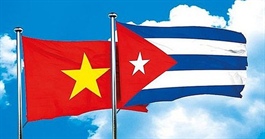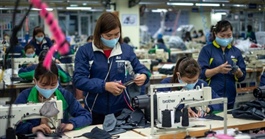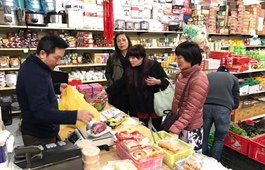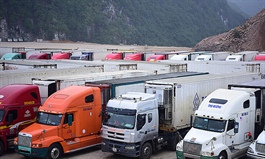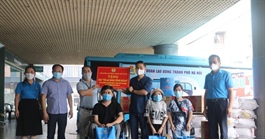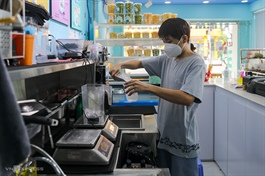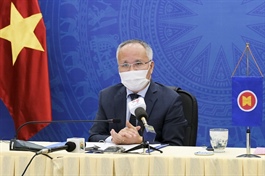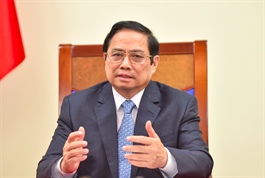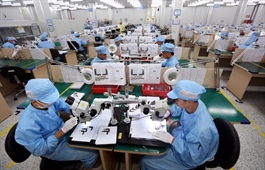HCMC’s continued social distancing vexes foreign firms
HCMC’s continued social distancing vexes foreign firms
HCMC’s extension of social distancing until Sep. 30 is increasing the financial burden on them and causing many to consider moving out of Vietnam, foreign companies warn.
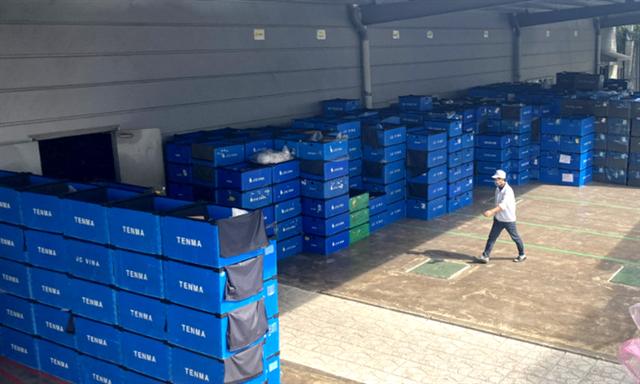
A worker is seen at the factory of Daeyoung Electronics Vina in Ho Chi Minh City. Photo courtesy of Daeyoung Electronics Vina
|
"Everyone must have expected that Covid-19 would stabilize and social distancing would end on September 15th," Lee Hee Bok, deputy director of Korean-owned Daeyoung Electronics Vina, said. "But it is very unfortunate that this is not the case."
The company in Thu Duc City has had hundreds of employees living on its premises since July 15, and they would be mentally and physically exhausted if they stay for two more weeks, he told VnExpress International.
Daeyoung, which makes parts for electronics products like LCD screens and refrigerators, has seen production fall to 40 percent of pre-pandemic levels since only 30 percent of employees are working.
"Customers are demanding more products, but we are unable to respond to their needs due to limitations in manpower and raw materials supply," Bok said.
Similar difficulties are reported by some American companies.
"The severe restrictions and lockdowns that Vietnam has imposed to curb the spread of the Delta variant has forced almost half of AmCham members to re-evaluate their business strategy and plans in Vietnam," John Rockhold, vice president of the American Chamber of Commerce in Vietnam (AmCham), said.
Providing accommodation for workers has been adding significant costs for American businesses, he said.
Transportation bottlenecks are also a major concern for AmCham members. The delivery of raw materials for production and goods for exports is affected due to inconsistency in interpreting regulations across the country, he added.
HCMC has extended its social distancing mandate by 15 days until September end as it continues to record thousands of new Covid-19 cases every day.
The city has had over three months of social distancing of various degrees of intensity, including a month’s "stay where you are" mandate.
The country’s biggest city is also a major manufacturing and commerce hub, and southern localities are dependent on its reopening to fully resume their own economic activities.
The prolonged restrictions are burdening Japanese companies, which were already struggling to house their workers.
No other Southeast Asian country has such a strict stay-at-work policy as Vietnam, Takeo Nakajima, chief representative of the Japan External Trade Organization Hanoi and vice chairman of the Japanese Chamber of Commerce and Industry in Vietnam said.
It is causing physical and mental health issues for workers, and the PCR tests for Covid required to be done every three days at the employer’s expense is also a burden, he said.
Feedstock and parts are imported into Vietnam from China, South Korea and Japan and finished and semi-finished products are exported to the world, but the restrictions are causing Japanese manufacturers in Vietnam to miss these opportunities, he said.
Australian companies said they face a similar plight, Simon Fraser, executive director of the Australian Chamber of Commerce Vietnam, said.
Companies who are producing domestically consumed products have seen a drop off in delivery of finished products due to consumer demand slowing, said Simon Fraser, executive director of the Australian Chamber of Commerce Vietnam (AusCham).
"There has however been the ability to stockpile some products which are not use-by-date sensitive for when the market starts to open up again."
Companies that rely on exports are adjusting their schedules and staffing to align with the slow down until transport operations start to return to normal services, he added.

A police officer checks travel details of shippers in Ho Chi Minh City on September 16, 2021. Photo by VnExpress/Quynh Tran
|
Possible relocating
Some companies have been considering relocating part of their manufacturing elsewhere if social distancing continues after Sep. 30.
The severe restrictions have already caused almost half of AmCham members to re-evaluate their business strategy and plans in Vietnam, Rockhold said.
"If restrictions on movement and activities extend into October, over one-quarter of our members said they would experience significant damage or will stop their business in Vietnam".
Vietnamese leaders must understand that economy-crippling restrictions are not sustainable, he said.
Nakajima said if the restrictions continue for months, global companies would not be able to compete and would look for alternatives.
"The Covid recovery map has changed quickly. Indonesia looked very negative two months ago, but currently it outperforms Vietnam."
Foreign companies want the government to give them more autonomy in managing their operations.
American companies need more flexibility in adopting safe operational models, Rockhold said.
"Workers need to be allowed to go home."
AmCham also wants the government to prioritize vaccination of not only workers in manufacturing but also the entire chain comprising port workers, cold chain operators and transportation workers, he added.
AusCham supports the government’s plans to re-open the country in a controlled manner with a big focus on mass vaccinations, follow-up testing and systematic tracing, Fraser said.
HCMC in recent weeks has started resuming some economic activities in an effort to eventually live with the pandemic. It has relaxed shopping restrictions in three districts.
Restaurants and coffee shops are now allowed to resume takeaway services, while over 82,000 shippers have been able to start working again.
Prime Minister Pham Minh Chinh earlier this month said Vietnam will not fail the trust of foreign companies pose in its ability to combat Covid-19 despite the challenges.
He told American businesses that the government was implementing multiple measures against Covid-19 and difficulties related to the pandemic were temporary.
Vietnam has inoculated 28.6 percent of its population, with around 6.8 percent have been fully vaccinated.
Nakajima approved of the government’s decision to shift its anti-pandemic strategy to "living with Covid-19 in a new normal."
"We learned from other countries that we cannot bring down Covid-19 cases to zero, but we can control them."



